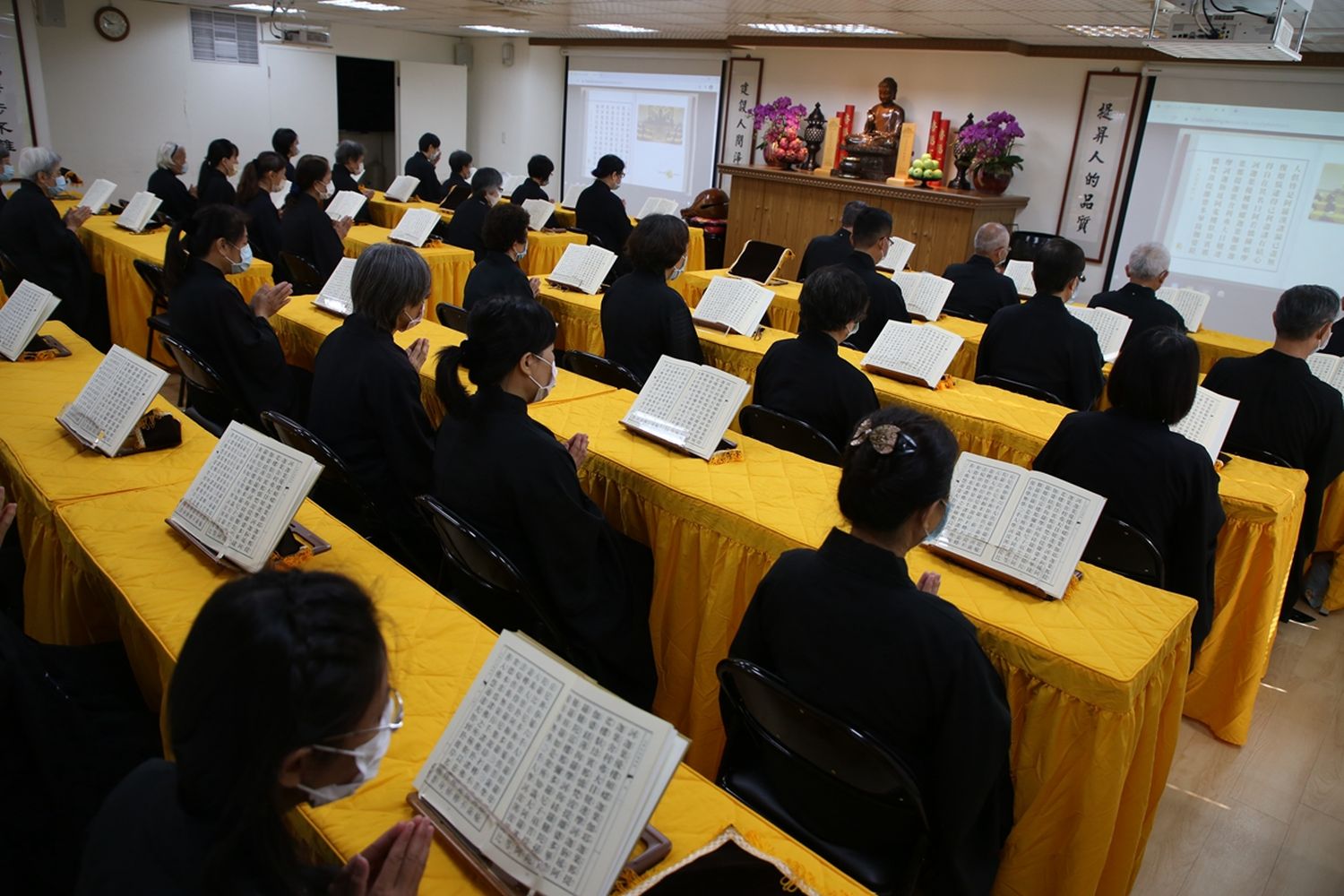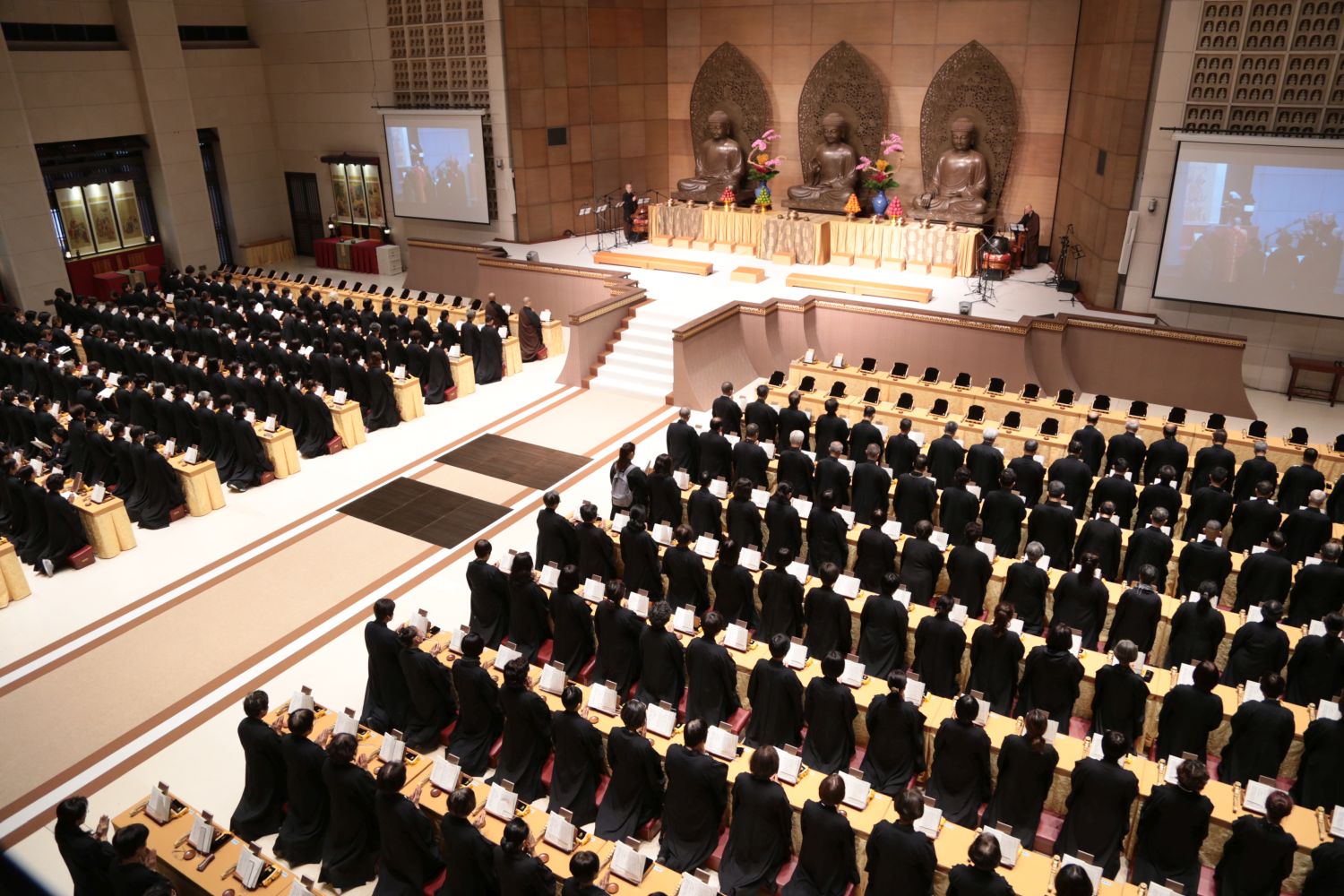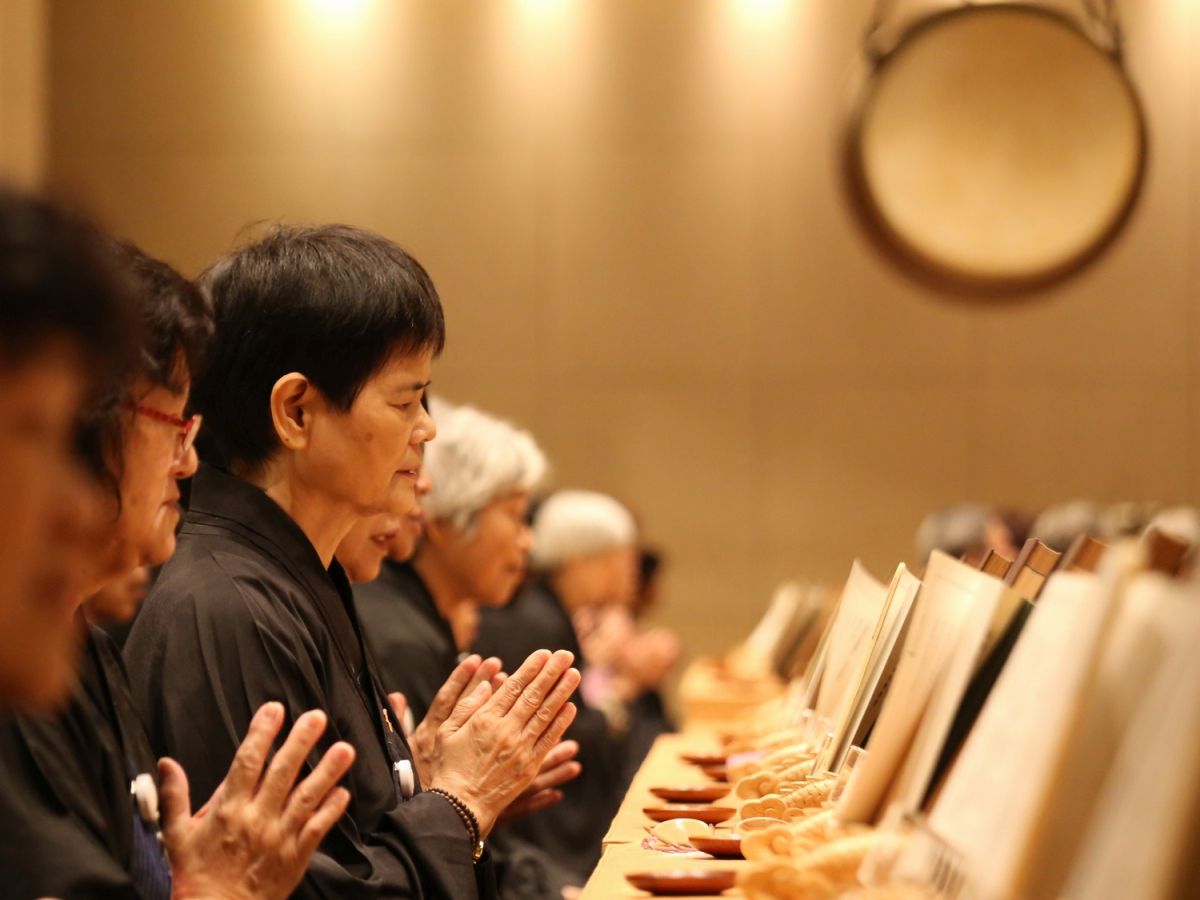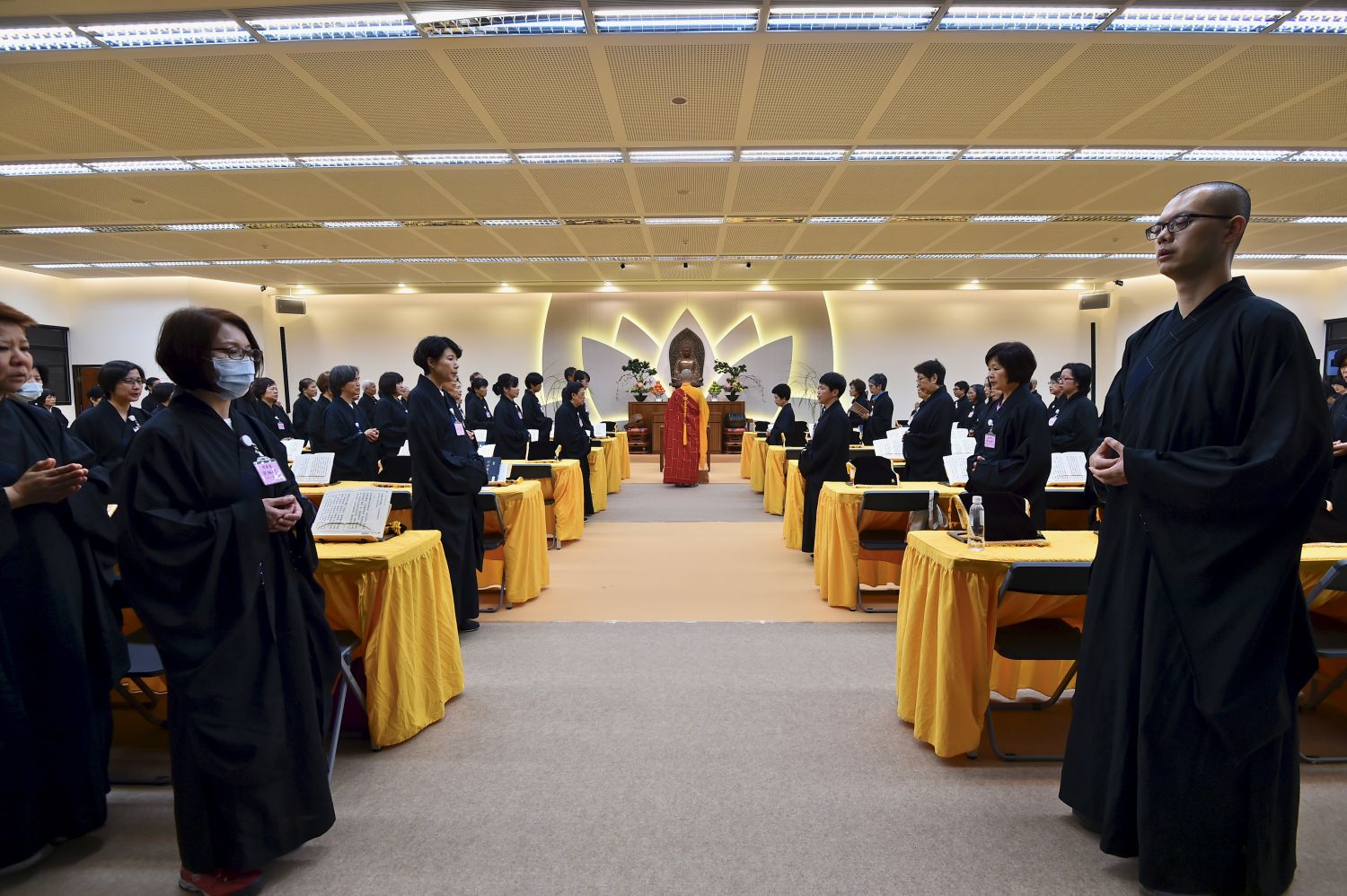Special Topics
Deliverance Service Benefits Both the Living and the Deceased
 Every July of the lunar calendar, Chinese people will hold various deliverance services to release the dead from suffering. Most people believe that without performing the deliverance ritual, they will not be able to enjoy peace in the seventh month of the lunar calendar, which is commonly known as the "ghost month". Whether it is the Zhongyuan Festival in Taoist belief or the deliverance service organized by Buddhist temples, deliverance and salvation for the deceased has become a collective religious activity in Chinese-speaking communities.
Every July of the lunar calendar, Chinese people will hold various deliverance services to release the dead from suffering. Most people believe that without performing the deliverance ritual, they will not be able to enjoy peace in the seventh month of the lunar calendar, which is commonly known as the "ghost month". Whether it is the Zhongyuan Festival in Taoist belief or the deliverance service organized by Buddhist temples, deliverance and salvation for the deceased has become a collective religious activity in Chinese-speaking communities.As the religious scholar Wang Jianchuan pointed out, the Chinese emphasis on deliverance of the deceased is rooted in the common belief that humans become ghosts after they die. Without proper rituals to honor them, these ghosts or spirits could cause harm to the human realm. Therefore, conducting deliverance services serves to appease these wandering souls of the dead. However, in Buddhism there is no such concept of a "ghost month"; rather, the seventh month of the lunar calendar is referred to as the "month of joy". This is historically rooted in the Buddha's day. On the fifteenth day of the seventh lunar month, when the Buddha's disciples completed their summer retreat, many of them would become enlightened and realize the fruition of practice after an extended period of meditation practice. This delighted the Buddha, which explains why this day is designated as the "day of joy". Over time, the idea evolved, and the entire month of July gradually came to be regarded as the "month of joy".
 The Buddhist practice of holding Dharma assemblies for delivering the deceased spirits during the seventh lunar month originated from the story of Maudgalyayana rescuing his mother. As recorded in the Ullambana Sutra, the Buddha instructed Maudgalyayana to give alms and make offerings to the monastic community on the 15th day of the seventh month of the lunar calendar—also known as "the day of dismissal of the summer retreat" — in order to rescue his mother from the realm of hungry ghosts. The Buddha instructed Maudgalyayana to do so because, on this day, it is highly possible for Maudgalyayana to offer alms to monks who have attained enlightenment or liberation, thereby acquiring immense merits and thus leading to the liberation of Maudgalyayana's mother from the realm of suffering, in addition to providing relief to other sentient beings trapped in the hellish realms. Both attending a Dharma assembly and transferring the merit to one's deceased parents for their deliverance can be regarded expressions of filial piety.
The Buddhist practice of holding Dharma assemblies for delivering the deceased spirits during the seventh lunar month originated from the story of Maudgalyayana rescuing his mother. As recorded in the Ullambana Sutra, the Buddha instructed Maudgalyayana to give alms and make offerings to the monastic community on the 15th day of the seventh month of the lunar calendar—also known as "the day of dismissal of the summer retreat" — in order to rescue his mother from the realm of hungry ghosts. The Buddha instructed Maudgalyayana to do so because, on this day, it is highly possible for Maudgalyayana to offer alms to monks who have attained enlightenment or liberation, thereby acquiring immense merits and thus leading to the liberation of Maudgalyayana's mother from the realm of suffering, in addition to providing relief to other sentient beings trapped in the hellish realms. Both attending a Dharma assembly and transferring the merit to one's deceased parents for their deliverance can be regarded expressions of filial piety.This Buddhist way of filial piety can be said to stem from the bond of human kinship. As Sociologist Wu Jiujun maintained, familial bonds do not end when their loved ones pass away. After a loved one's death, people tend to have a lingering sense of regret, as well as a strong sense of remembrance. Fearing that the deceased may suffer in an unknown realm, the living feel they must do something to compensate for what might have been left undone during their loved one's lifetime.
Now, what should be done for the deceased loved ones? Buddhism holds that the best blessing for the deceased is to help them hear the Buddha's teaching and aspire for rebirth to Amitabha Buddha's Pure Land, thus attaining liberation from the cycle of birth and death. The best way to help deceased loved ones to be present in a Dharma assembly and to hear the Buddha's teaching is to personally participate in the assembly with utmost sincerity and devotion. Through deep bonds of kinship, the spiritual response is more easily generated. Furthermore, with utmost sincerity, one can evoke a spiritual response, thus inviting them to come and listen to the scriptures.
In the article "Does Buddhism Teach the Efficacy of Delivering the Dead?" in his book Orthodox Chinese Buddhism, Master Sheng Yen pointed out: "Deliverance means to free the dead from unhappy destinies and help them be reborn in a land of bliss. The deliverance is effective because of the sympathetic resonance induced by the good karmic deeds that family members and friends of the deceased have preformed. In fact, the monks' effective ritual chanting of sutras does not in itself have the power to deliver the dead."
Furthermore, the efficacy and spiritual response pertaining to deliverance is documented in many sutras. Apart from the account in the Ullambana Sutra, it is also found in the Ksitigarbha Sutra, which includes the story of Ksitigarbha Bodhisattva in his past lives being a filial daughter, both as the bright-eyed daughter and the Brahmin girl respectively. She performed various virtuous deeds and made offerings for the sake of rescuing her mother, who had fallen into the unfortunate state of existence. Through the power of her sincere filial devotion, she saved and thereby released her mother from the suffering of hell.
To perform deliverance is mainly the job for the family members of the deceased
 In China, the creation of Buddhist deliverance services can be traced back to Emperor Wu of the Liang Dynasty. The most well-known ritual in this regard is the Emperor Liang Repentance. According to legend, Empress Xi, the wife of Emperor Wu, was a jealous person during her lifetime. After her passing, she was reborn as a serpent. One day, she appeared in the palace, seeking help from Emperor Wu. He then sought assistance from Master Baozhi, who subsequently formulated the Emperor Liang Repentance rite, organized a Dharma assembly, and finally successfully liberated Empress Xi from the animal realm, thus enabling her to be reborn in a heaven. Moreover, the Compassionate Samadhi Water Repentance formulated by the National Master Wuda is also a commonly practiced method of deliverance and repentance practice in Chinese Buddhism.
In China, the creation of Buddhist deliverance services can be traced back to Emperor Wu of the Liang Dynasty. The most well-known ritual in this regard is the Emperor Liang Repentance. According to legend, Empress Xi, the wife of Emperor Wu, was a jealous person during her lifetime. After her passing, she was reborn as a serpent. One day, she appeared in the palace, seeking help from Emperor Wu. He then sought assistance from Master Baozhi, who subsequently formulated the Emperor Liang Repentance rite, organized a Dharma assembly, and finally successfully liberated Empress Xi from the animal realm, thus enabling her to be reborn in a heaven. Moreover, the Compassionate Samadhi Water Repentance formulated by the National Master Wuda is also a commonly practiced method of deliverance and repentance practice in Chinese Buddhism.However, many people only visit temples to have memorial tablets established, written with the names of their deceased relatives or those with whom they have unresolved karmic debts from past lives. Yet they themselves do not attend the ceremonies; instead, they rely on monastics to do the job of merit-transfer on their behalf. Does this achieve the purpose of transferring the merit to the deceased? From the examples found in the Ksitigarbha Sutra, we know that it is possible to bring liberation to deceased parents who have fallen into hell. This is possible provided that the deceased parents' children exhibit sincere filial devotion to recite the Buddha's name with devout reverence, while relying on the virtuous power of the Three Jewels. Therefore, Master Sheng Yen also emphasized that "to perform deliverance is mainly the job for the family members of the deceased, instead of monastics."
Deliverance services benefit both self and others
The Buddhist practices of sutra recitation and repentance created by ancestral patriarchs and masters were originally meant for intense self-cultivation, rather than for delivering the souls of the dead. Based on their compassionate intention to benefit self and others, the patriarchs and masters diligently engaged in the practice of sutra recitation and repentance, aspiring to help all beings in the dharma realms to attain liberation. Therefore, deliverance rituals benefit not only the dead, but also the living. Hence, Master Yin Shun's article "The Noble Virtues of Ksitigarbha Bodhisattva and the Methods of His Practice" states that "when performing the sutra recitation and repentance ritual for the deceased, one should regard it as creating virtuous merit for oneself in order to achieve the best effects." As stated in the Ksitigarbha Sutra: "Of all the virtuous deeds performed for deliverance purposes, the deceased can receive only one-seventh of the benefit, whereas the remaining six-sevenths goes to the living persons who perform the ritual."
 Master Sheng Yen pointed out that a Dharma assembly must fulfill an educational function which facilitates the purpose of practice. Dharma assemblies are meant to provide Buddhist concepts to help people adjust their mindsets and mend their actions. If one participates in deliverance services merely for the sake of following a convention, at best they may only find some psychological comfort.
Master Sheng Yen pointed out that a Dharma assembly must fulfill an educational function which facilitates the purpose of practice. Dharma assemblies are meant to provide Buddhist concepts to help people adjust their mindsets and mend their actions. If one participates in deliverance services merely for the sake of following a convention, at best they may only find some psychological comfort.In fact, the Buddhist philosophy of dispelling calamities lies in practicing repentance and making vows. The Ksitigarbha Sutra says: "... every single movement or every thought that arises on the part of beings of Jambudvipa is an offense." In our daily life, throughout countless past lifetimes, we have intentionally or unintentionally caused harm to others. We must repent before the Buddhas and Bodhisattvas, thereby purifying our bodily, verbal, and mental actions, and vowing not to repeat the same mistakes. Furthermore, we request the Buddhas and Bodhisattvas to bear witness that we are committed to taking responsibility for our negative karma. For our past karmic creditors trapped in the realms of ghosts and spirits, we guide them through Buddhist practices of sutra recitation, repentance, giving, and making offerings. Through Buddhist teachings, we help them open their mind and understand the truth, thus leading them to liberation from suffering. When our past karmic creditors' minds are free from the burden of resentment and are able to leave suffering behind for a better rebirth, they will no longer seek revenge for past grievances.
Before attaining Buddhahood, the Buddha saw that all sentient beings were connected to him through karmic ties. Therefore, he made a vow to liberate all sentient beings. Hence, whether it is our present-day parents and relatives or even karmic creditors from countless past lifetimes, every sentient being has some connection with us. In Dharma assemblies, practitioners offer blessings not only for their departed loved ones but also for all sentient beings connected to them through shared karmic affinities.
Related articles:
Deliverance Service Benefits Both the Living and the Deceased
The Seventh Lunar Month Dharma Assemblies (I): The Ullambana Assembly – Repay Our Parents' Kindness with Merit Transfer
Dharma Assemblies in Lunar July (II): Yogacara Ulka-mukha Dharma Service to Save Hungry Ghosts from Suffering
Dharma Assemblies in Lunar July (III): Practicing Repentance at Emperor Liang’s Repentance Eliminates Delusion, Karma, and Suffering
Q1: Where will our relatives go after death? If they are already reborn, would our prayers for the deceased help them?
Q2: Is it necessary to participate in Dharma assemblies if they are not performed for the deliverance of a deceased relative?
Q3: Why does Buddhism maintain that care and concern for the deceased can be conveyed through Dharma assemblies?
Q4: If we are unable to attend a Dharma assembly at a temple or monastery, can we, alternatively, perform the deliverance ritual at home for our deceased relatives or friends?
Q5: How do we go about dedicating the merit? Can our deceased relatives actually receive the merit that is being dedicated?
Resource: Issue 240 of Humanity Magazine, Dharma Drum Publishing Corporation
Translation: 可馨
Editing: Keith Brown, Chiacheng Chang (張家誠)
